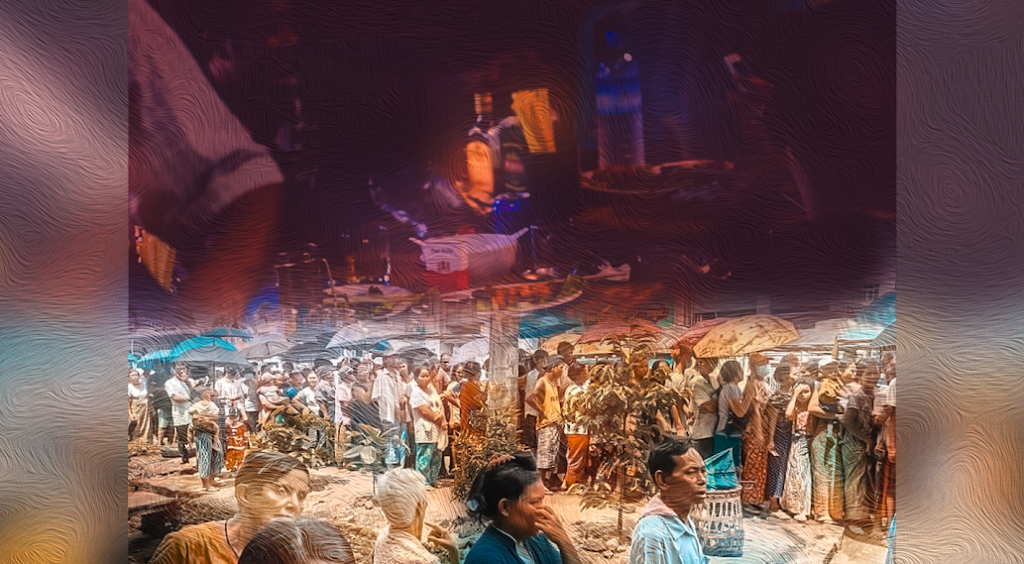Myanmar Spring Chronicle – October 03
Published by MoeMaKa on October 04, 2023
Growing Disparity in Challenging Times: Unveiling the Shadows of Corruption
In the wake of the military coup, Myanmar’s economy is facing challenges from all fronts. Whether we examine GDP growth, consumption indices, the swelling population in need of humanitarian assistance, or the increasing inflation, it’s evident that the data is not showing signs of recovery; instead, it paints a grim picture of decline and recession.
Nevertheless, in major cities like Yangon and Mandalay, the removal of COVID-19 restrictions in 2020 has triggered a resurgence of life in restaurants, bars, and nightclubs. These social hubs had been dormant for over a year following the military coup. Once the restrictions were lifted, beer shops and nightclubs roared back to life.
On one side of the spectrum, the underprivileged are grappling with shrinking incomes due to inflation, while on the other side, beer shops, bars, and nightclubs are teeming with activity. In Yangon, bustling streets like Insein Road, Parami Road, Yadanar Road, Waizayandar Road, and Lay Daung Kan Road, bordering South Okkalapa, Thingangyun, and Yankin Townships, come to life with patrons flocking to these venues every night.
Surprisingly, despite incidents of shootings, assassinations, and explosions, city centers appear lively as if untouched, while people in villages across the country are fleeing their homes amid armed conflicts and arson. As commodity prices soar and earnings from agriculture and livestock dwindle significantly, questions arise about how some urban residents seem to have a seemingly endless supply of money.
In the challenging era post-coup, bribery has surged to levels three to four times higher than pre-coup times. Recent high-profile cases have seen the arrest and investigation of two military council-affiliated generals, as well as a non-member general and deputy minister. These developments offer a glimpse into the extent of corruption prevailing during the military council’s rule.
A military general with close ties to the military council’s leader, whom he trusted, allegedly accepted significant sums of money in bribes for signing off on business licenses and permits. The spike in palm oil prices and issues related to smuggling are not caused by external factors but rather stem from mismanagement, policy failures, and corruption within the military council. These cases extend beyond economic matters into political arenas, where victims claim to have been forced to pay bribes, ranging from 100,000 to 150,000 kyats to millions, in cases related to arrests and asset confiscations authorized by individuals in positions of authority.
For instance, cases of arbitrary arrests near crime scenes, such as shootings or explosions, have seen police stations and security agencies solicit bribes ranging from 80,000 to 100,000 kyats, regardless of the individuals’ actual connection to the incidents. Similarly, in situations where informants were accused of terrorism, individuals without substantial evidence found themselves paying bribes, ranging from tens of thousands to hundreds of thousands, or even into the millions, in exchange for their release. Unlike previous military regimes or dictatorships, the military council that emerged after the coup appears to have established a disturbing trend where individuals arrested on political charges often claim they were extorted for money and many secured their release by paying bribes.
A former police chief in a border town along a trade route, following the military coup, divulged that his monthly earnings soared to hundreds of thousands of lakh kyats. Reportedly, money extracted from individuals arrested on suspicion of links to political movements or acts of violence, as well as funds from other criminal activities like drug offenses, allowed police station heads to distribute between 1,000,000 and 1,500,000 kyats monthly, even to the guards stationed at the entrance of their respective police stations.
Some members of the military council’s security personnel appear content with the current situation that allows them to accept bribes without restraint. In an era where public dissent is virtually non-existent, and news media reporters work in anonymity, bribery and corruption are thriving exponentially. In recent years, incidents involving the arrest of wealthy entrepreneurs have witnessed significant monetary exchanges with police officers, military personnel, military intelligence agents, and individuals from the Bureau of Special Investigation (BSI) who were involved in the arrests.
One entrepreneur, who prospered through government tenders during the National League for Democracy’s (NLD) rule and now maintains a comfortable relationship with the military council, was arrested by the military council after information regarding his activities was leaked on social media. Subsequently, the businessman secured his release by paying hundreds of millions of kyats in bribes.
This atmosphere of bribery, corruption, and abuse of power has fostered a class of individuals who can amass money with ease during trying times and spend extravagantly.
These individuals who can freely spend thousands of dollars in beer shops, bars, and nightclubs are the beneficiaries of issues like the sale of power and authority, monetary policy errors by the military council, the consequences of issuing various orders, and the speculative trade of dollars, real estate, and vehicles. This peculiar scenario has surfaced amid the tumultuous economic and political landscape in the country.

